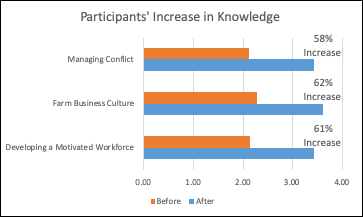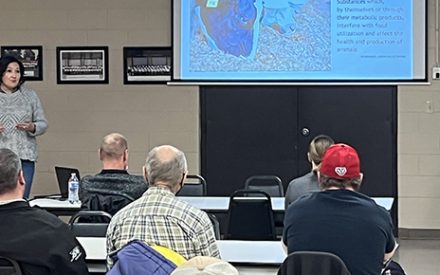Situation
Agriculture is central to a prosperous Wisconsin, contributing over $100 billion annually to our state’s economy and nearly 12% of our state’s employment (providing over 435,000 jobs)[1]. Running a successful farm business is increasingly challenging and the current economic situation continues to have an impact financially for many farms. Much uncertainty exists for commodity markets and several factors influence prices, including weather, trade agreements for important export markets, the economy overall, and the continued impact of the coronavirus outbreak. Weathering these uncertainties depends on farm owners successfully managing their farm’s financials, effectively managing their workforce, considering alternative enterprises as appropriate, or all three. When the time comes, farm owners also need to have an effective transition strategy to provide for themselves as they shift towards retirement.
Programming includes:
- Making Ends Meet – Farm Financials
- Navigating Farm Price Risk Programs
- Managing a Farm’s Labor Force
- Diversifying the Farm Enterprise
- Successfully Transitioning Farm Ownership
Making Ends Meet – Farm Financials
In facing risks and remaining viable, one of the aspects farmers can control is learning how to use farm financials to effectively evaluate and make decisions based on sound analysis. Today’s successful farm operators are using detailed financial statements to identify the most profitable farm enterprises for their operation, determine per unit production costs, track trends and financial progress in the business and create comprehensive business plans. From these financial records and statements, financial measures can be calculated and benchmarked, which in turn can be used to more effectively manage cash flows, make investment or liquidation decisions and to explore alternative uses of capital investments in the farm operation.
Extension responds by providing unbiased information and resources that help farmers learn the “hows” and “whys” of financial management and gives them tools to examine their farm financials to make informed business decisions. In January 2020, Extension educators offered a statewide workshop series for farmers and ag professionals, where participants gained an awareness of how to evaluate their finances and take the pulse of their farm business and goals for the future.
Of the 39 farmers who participated in the workshops, 39 reported they increased their understanding of financial reports and analysis (on average increasing their understanding by .7 points on a 5-point scale) and how financial statements can be used to make informed decisions about their farm (average increase of .8 points on a 5-point scale). In addition, 89 percent said they wanted to learn more, and planned to prepare and/or analyze financial reports as a result. Individual participants noted it was “helpful to get perspectives from different farmers”, and that they were “very glad I came because I learned a lot!”
During May and June, Extension educators and specialists virtually provided facilitation to the Heart of the Farm (HOF) Women in Agriculture Coffee Chats program, providing connectedness and coaching with three interactive sessions to address questions and fears farm women may be experiencing, as they answer the question, “Can we weather the COVID-19 storm?” A Coffee Chat provided information on “Finding Financial Well-Being,” and explored four factors and ideas to find a personal path to financial well-being. As a result of attending, participants reported that they acquired ideas to apply to their own financial well-being. In addition, 87.5 percent recognized what helps people feel better about their finances.
Navigating Farm Price Risk Programs
Federal Farm Bill program assistance made up a significant amount of farm income in 2019. Farmers and the USDA Farm Service Agency rely on Extension to provide analysis, recommendation, and education to help farmers make informed risk management decisions. In 2019 and 2020 Extension specialists and educators provided unbiased, research based information to assist with decisions for the Dairy Margin Protection and the Agriculture Risk Coverage (ARC) or Price Loss Coverage (PLC) programs, authorized by the 2018 Farm Bill. Over 300 Wisconsin farmers attended price risk management educational programs held in over 30 counties in 2019 and 2020. Participants found the information helped improve their understanding of the federal programs (94%). Individual participants noted “it gave me a lot of information that can now be applied”, “better understanding will make it easier to make a good decision”, and “I was able to get my questions answered and make a decision between ARC and PLC”.
Managing a Farm’s Labor Force
In the past, many Wisconsin farms relied primarily on family members to provide the necessary labor. Today, as farm businesses across our state grow in size and complexity, their workforces continue to grow and change. In a recent study conducted by UW-Madison, dairy managers identified employee turnover as the leading cost associated with human resources management. This is exacerbated by a decrease in Wisconsin’s rural workforce due in part to an aging population and a trend of young people moving away from rural areas. Additionally, effective human resources structures (such as employee handbooks) and processes (such as regular employee meetings and regular performance reviews) are not in place in about half the farm operations in Wisconsin. All of these factors make it crucial that farm managers build and refine the skills needed to effectively lead and manage.
Extension responds by helping farm leaders acquire the knowledge and skills needed to recruit, motivate, and retain quality people. In 2017-2019, Extension colleagues offered programs for farm owners/managers in several locations around the state, reaching over 150 farm owners/managers. Through the use of peer-to-peer learning, these participants built skills in leadership, conflict management, communication, and on-boarding best practices.
In retrospective pre-post evaluations, the most significant outcomes for participants were increases in knowledge around how to manage conflict (58% increase), how to create a positive farm business culture (62% increase) and how to develop a motivated workforce (61% increase)

When asked to share in their own words what they learned, participants reported:
Understanding how others can see the same subject so differently.
Techniques to use on meetings for our staff to resolve issues.
By providing the groundwork to help them to become better and more effective human resource managers, farm managers can become the employers of choice in today’s very competitive labor market. In the long term, these skills help reduce costly employee turnover and retraining, improve safety through a well-trained and highly engaged workforce, and enhance profits through improved workforce efficiency and productivity.
Diversifying the Farm Enterprise
The long span of low market prices has spurred interest by some farms to diversify their revenue stream in order to reduce income variability of the farm business. Diversification typically reduces large year-to-year variations in income and may ensure adequate cash flow for meeting production costs, debt obligations, and family living needs. However, to acquire knowledge about an alternative business, expertise on new production or marketing practices, or information on equipment needs for new enterprises, farm owners need access to unbiased information to make informed decisions.
In 2019, Extension educators collaborated with farmers and agriculture industry partners to offer the second annual Resilient Farms Conference to explore examples of farm resiliency through diversification with new or alternative farm enterprises. Ninety-eight percent of conference attendees indicated they increased their knowledge of a potential business enterprise of interest with topics such as financial education, business and transition planning, marketing and risk management for value-added processing including rules, regulations and other legal considerations. Attendees expressed satisfaction with the conference’s focus on farmer-to-farmer networking and idea sharing, noting “I was able to talk openly about ideas without being looked at as if I was crazy” and “Hearing others’ experiences and ideas even if not my area of production was relatable and helpful”. Eighty-one percent of attendees would recommend attending the conference to a friend.
Successfully Transitioning Farm Ownership
Many farms eventually need to explore options for successfully transitioning the farm to the next generation. Today’s farm population is aging, however a high percentage have not made plans related to transitioning their farms to a successor generation. Farmers need to think ahead for how to support themselves in retirement and, at the same time, consider if and how to transition the farm business to the next generation so the business can support both their retirement and the next generation’s family living. Planning for retirement is challenging when all profits of the farm are reinvested into the farm, loading retirement portfolios with illiquid assets.
In addition to the financial complexity, transitions often involve a lot of emotions for farm families. Families may have concerns about being fair to all children. Decisions need to be made about how the farm is managed and how much management or control each generation will have. Successful transitions depend on effective communication around this highly emotional topic. Having intentional conversations around farm succession and developing future plans for the farm provides a better chance of transition success
In early 2020, Extension educators offered introductory farm succession workshops at 5 regional locations, attended by 75 local farmers. Participants learned about a variety of resources, people and tools that would help them be successful in farm succession plans. They were also given the opportunity to have individual meetings with resource speakers, including a lawyer, a tax specialist, an aging resource specialist, and farm service agency staff.
As a result of participating in the workshop, participants reported learning about tools to help them develop their vision and goals for the farm business (on average increasing their understanding by 1.2 points on a 5-point scale). In addition, 92 percent said they planned to seek out resources and/or professionals to help in their farm succession planning; and 90 percent said they plan to implement one or more steps in their farm succession plan. One participant noted “I found the morning helpful, esp to hear how other farm families are working through their realities, along with getting a more clear vision, goals”. By learning about resources and steps in succession planning, Wisconsin farmers are equipped to have important conversations and can develop plans that lead to successful farm transitions.
The Extension Farm Management Program provides research-based farm business management information, resources and decision-making tools to farmers and agribusinesses to improve business profitability and lifestyles through informed decision-making. For more information about the UW-Madison, Division of Extension Farm Management Program, and the Program’s county based Educators, and Specialists on campuses at Madison, River Falls and Platteville, please visit farms.extension.wisc.edu
[1] https://datcp.wi.gov/Pages/Publications/WIAgStatistics.aspx


 Protecting Water Quality through Agricultural Practices
Protecting Water Quality through Agricultural Practices Business Planning for Profitable, Safe Farms
Business Planning for Profitable, Safe Farms Planning to Ensure a Viable Business
Planning to Ensure a Viable Business Economic Viability for Beef Producers
Economic Viability for Beef Producers


